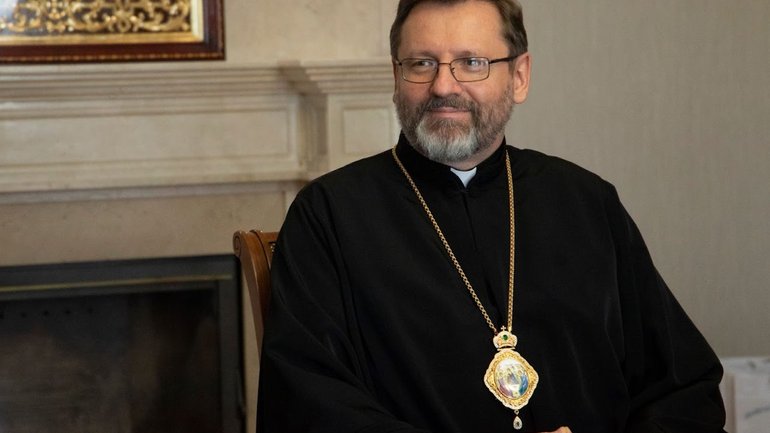The Head of UGCC: War in Ukraine has exposed problems that the world preferred to turn a blind eye to

According to the Information Department of the UGCC, His Beatitude Sviatoslav discussed the repercussions of the war in Ukraine on the global political, diplomatic, and security systems in his conversation with Krzysztof Tomasik for the book "God Did Not Leave Ukraine."
Why do leaders of states and representatives of diplomatic corps from different countries say that Kyiv is now the center where the future of world diplomacy is decided?
"This is because Russia's war against Ukraine has undermined the foundations of law and international relations," explained the head of the UGCC. "When a major power can violate the borders of a neighboring country with impunity, and even receive nuclear weapons from that country, become a guarantor of its borders, and then threaten it with nuclear weapons, it means that international law no longer works. This leads to a situation where there is no rule of law, only the right of the strongest, and all international institutions established after World War II based on international law lose their legitimacy. These institutions and international law were supposed to protect the world from future wars. Even the European Union, which was created to guarantee peace in Europe, was based on this idea. As a result, all the mechanisms that allowed nations and states to coexist before February 24, 2022, have lost their foundations."
His Beatitude Sviatoslav stressed that Ukraine is now at the center of attention of all international institutions because the war and Russia's invasion have completely exposed the crisis of international law and world diplomacy. "What is the foundation of diplomacy?" he questioned. "Diplomacy is more than just trading between countries. The world isn't a big bazaar where the price of oil, gas, or even peace is negotiated. Diplomacy is based on international law. When international law fails, there is nothing left to discuss. As a result, this war has placed Ukraine at the center of activity of all international institutions, which address humanitarian and security issues, as well as other types of interstate relations in the modern world."
Ukraine is now in the spotlight because, if Russia wins, it would mean that the Third World War has fully begun. In such a scenario, no small country would feel secure enough to refrain from developing its own nuclear weapons. Diplomacy would no longer be effective in providing security. The only thing that would matter would be "my army, my weapons, and my atomic bomb," which the Russian Orthodox Church boasts of and blesses. This would mean that we are entering a world of jungle-like savagery, rather than one of civilization. Today, the question of Ukraine, the end of the war, and the restoration of its borders to those of 1991 is a question of whether international law can overcome blind aggression or not. As a result, Ukraine has become the epicenter of global events."
The world is shaking to its foundations and must change — there is no other way. How does the head of the UGCC see Ukraine's mission in the modern world?
"First of all, we must realize Ukraine's mission for ourselves. We are currently experiencing the direct pain and tragedy of war and the full consequences of which we do not yet know. However, even now, we are revealing some very deep, fundamental foundations that the world must return to.
Today, Ukraine testifies to the whole world, a world of post-truth and loses certain moral determinants, that there are values without which a person cannot live. And these values are by no means economic well-being. Ukrainians are now giving their lives for human dignity, for the right to life and freedom. These are the foundations of every civilized free society. If a country builds interpersonal relations in a way where oil and gas prices are more important than the price of human life, then such a country is doomed. In the end, it will be the civilization of Judas thirty pieces of silver that has lost something priceless."
His Beatitude Sviatoslav emphasizes that Russia is waging a colonial war in Ukraine today, seeking to maintain its imaginary image of a post-Soviet empire through enslavement. However, Ukraine stands firm and says "no" to these desires. Today, Ukraine testifies that Russia is indeed waging a colonial war in Europe, although it is difficult for many to understand and realize this. For instance, Europeans have always been colonizers to Argentines, making it difficult for them to fathom that Europe could have any real problems. People in Latin America, Africa, and Asia also share this belief that only countries exempt from European colonialism have genuine issues. However, Ukraine is liberating itself from Russian colonialism in Europe. Therefore, the theory of liberation that the liberation theology born in Brazil is so proud of is impossible without a free Ukraine.
Just as the United States once said "no" to England and emerged as a free state, just as Argentina said "no" to the Spanish crown and a sovereign state emerged in southern Latin America, just as Brazil said "no" to Portugal and a great cultural continent in Latin America emerged, as India said "no" to Great Britain and a great Indian subcontinent emerged, as Morocco said "no" to France and a prosperous state in North Africa emerged, so today Ukraine says "no" to Russia, and one can be sure that it will never say "yes" again. If people now repeat that the new world should be free from any colonialism — political, ideological or economic — and do not understand that there can be no place for Russian colonialism in it, especially in Europe, then this free world will never exist."









